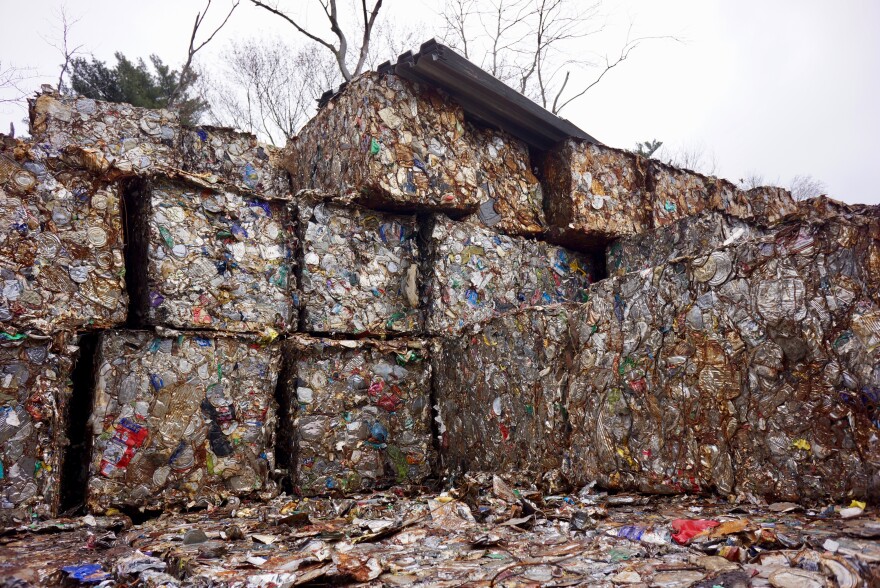Changes in overseas markets have impacted what gets recycled and how. But when you put a drink can or a metal food container into your blue bin here on Cape Cod, there’s a good chance that it will be recycled into another metal product.
This story is part 1 in our series, The Big Blue Bin: Following the Path of Cape Cod's Recycling.
The Family Pantry in Harwich collects bottles and cans from transfer stations around the Cape. On this morning, volunteers are sorting the day’s haul of glass, plastic bottles, and cans into separate bags.
Jim O’Bara has worked at the pantry for about 5 years. He says the money from turning in these bottles and cans makes up a fifth of the pantry’s budget.
“That was the first source of revenue, sorting bottles and cans,” O’Bara says. “It’s a great revenue source. It helps us support the pantry. Plus, we’re recycling.”

You probably know, when you buy a drink in a can, you’re also paying an extra 5 cent deposit. Every can that doesn’t get redeemed by the purchaser still has that value.
Most of the recycling itself happens at mills in the midwest and Kentucky, where the cans will be melted down and made into more cans, or materials for things like airplanes or cars.
Before they are sent to those recyclers, the cans have to be compacted and baled. That can happen at a place like Mid City Scrap in Westport, on the South Coast.
Chris Kessing’s an overseer for Mid City Scrap. "We are not recyclers," he says. "We are waste stream diversion specialists." Mid City Scrap makes a business out of being the middleman in the recycling industry.
Kessing says roll-off trucks come in to the warehouse full of aluminum cans. A loader pushes them onto a big conveyor belt that carries the cans up and then drops them into a chute.
The cans are then made into blocks. The dense cubes of metal are only a few feet tall, but each one has more than 30,000 cans packed into it.
There’s also another metal in your blue bin that gets processed here: steel food cans. Think tuna cans, bean cans, that kind of thing.

There’s no deposit for these items, but Kessing says this steel is valuable. And it maintains its quality, even if you recycle it over and over again.
“The steel that’s in that can could have been the siding on a building where great things happened a whole long time ago, that was recycled and used to make a tin can. And now it’s been back in the waste stream and here you have it,” he says.
When it comes to aluminum and steel, Kessing says, the value of those metals above ground is greater than the value of the materials that come out of the ground to make them.
“To make aluminum from raw material requires a tremendous amount of bauxite mined, and an incredible amount of water and electricity,” he says.
So companies have a big incentive to recycle. And it works. When you buy a beverage in a can, 75% of that can is made from recycled materials, likely right here in the U.S.
But the process does have a significant carbon footprint. Think of it: all that metal has to be hauled around, from redemption centers to scrapyards to recycler, much of it on trucks.
Kessing says, “It gets kind of depressing after a while when you see the same things over and over. How many aluminum cans could there possibly be in southeastern massachusetts and the Cape?”
Kessing is sipping his coffee from a re-usable mug. Even though metal recycling works, he says, he’d be happy if less people needed his services.






